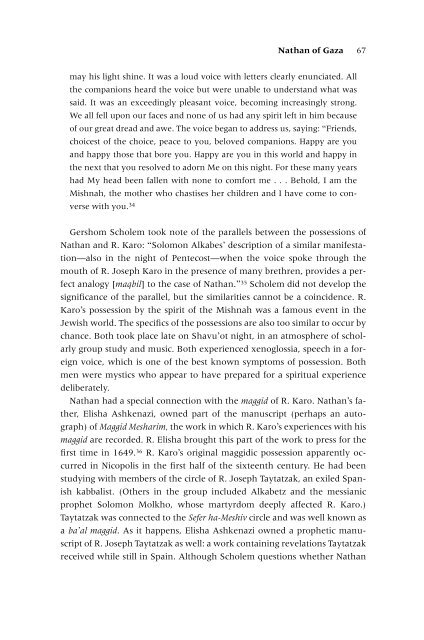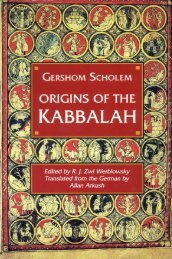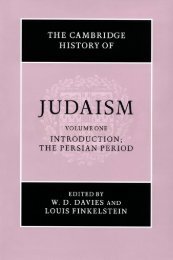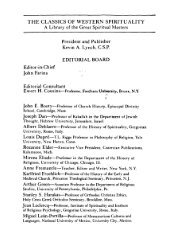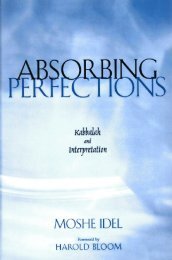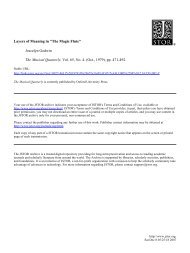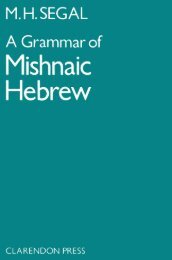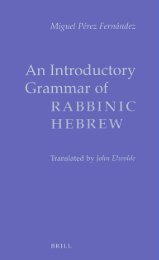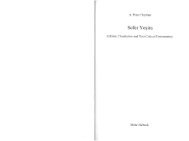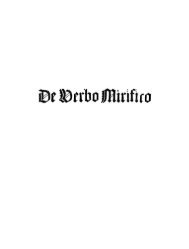Create successful ePaper yourself
Turn your PDF publications into a flip-book with our unique Google optimized e-Paper software.
Nathan of Gaza 67<br />
may his light shine. It was a loud voice with letters clearly enunciated. All<br />
the companions heard the voice but were unable to understand what was<br />
said. It was an exceedingly pleasant voice, becoming increasingly strong.<br />
We all fell upon our faces and none of us had any spirit left in him because<br />
of our great dread and awe. <strong>The</strong> voice began to address us, saying: “Friends,<br />
choicest of the choice, peace to you, beloved companions. Happy are you<br />
and happy those that bore you. Happy are you in this world and happy in<br />
the next that you resolved to adorn Me on this night. For these many years<br />
had My head been fallen with none to comfort me . . . Behold, I am the<br />
Mishnah, the mother who chastises her children and I have come to converse<br />
with you. 34<br />
Gershom Scholem took note of the parallels between the possessions of<br />
Nathan and R. Karo: “Solomon Alkabes’ description of a similar manifestation—also<br />
in the night of Pentecost—when the voice spoke through the<br />
mouth of R. Joseph Karo in the presence of many brethren, provides a perfect<br />
analogy [maqbil] to the case of Nathan.” 35 Scholem did not develop the<br />
significance of the parallel, but the similarities cannot be a coincidence. R.<br />
Karo’s possession by the spirit of the Mishnah was a famous event in the<br />
Jewish world. <strong>The</strong> specifics of the possessions are also too similar to occur by<br />
chance. Both took place late on Shavu’ot night, in an atmosphere of scholarly<br />
group study and music. Both experienced xenoglossia, speech in a foreign<br />
voice, which is one of the best known symptoms of possession. Both<br />
men were mystics who appear to have prepared for a spiritual experience<br />
deliberately.<br />
Nathan had a special connection with the maggid of R. Karo. Nathan’s father,<br />
Elisha Ashkenazi, owned part of the manuscript (perhaps an autograph)<br />
of Maggid Mesharim, the work in which R. Karo’s experiences with his<br />
maggid are recorded. R. Elisha brought this part of the work to press for the<br />
first time in 1649. 36 R. Karo’s original maggidic possession apparently occurred<br />
in Nicopolis in the first half of the sixteenth century. He had been<br />
studying with members of the circle of R. Joseph Taytatzak, an exiled Spanish<br />
kabbalist. (Others in the group included Alkabetz and the messianic<br />
prophet Solomon Molkho, whose martyrdom deeply affected R. Karo.)<br />
Taytatzak was connected to the Sefer ha-Meshiv circle and was well known as<br />
a ba’al maggid. As it happens, Elisha Ashkenazi owned a prophetic manuscript<br />
of R. Joseph Taytatzak as well: a work containing revelations Taytatzak<br />
received while still in Spain. Although Scholem questions whether Nathan


